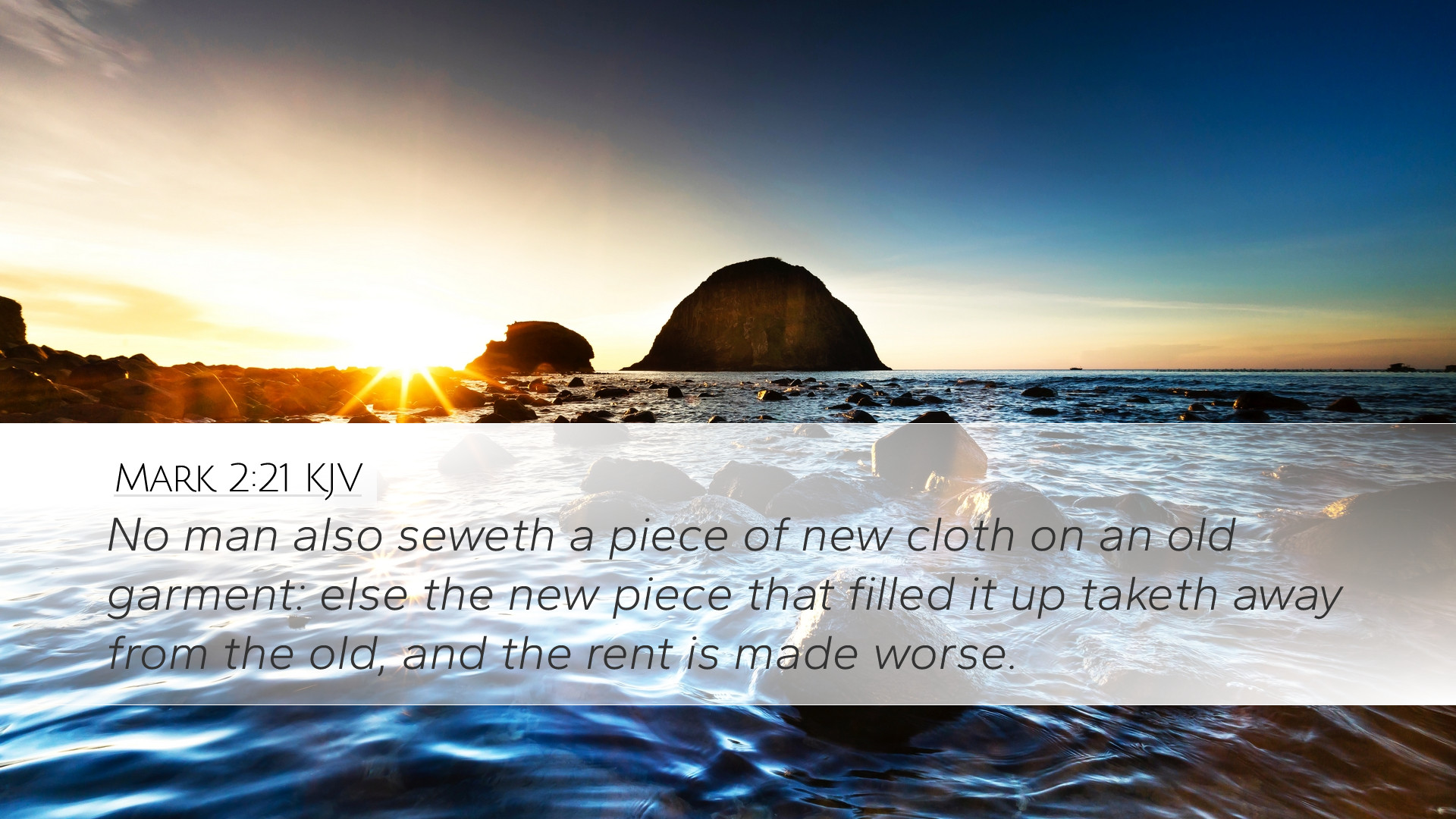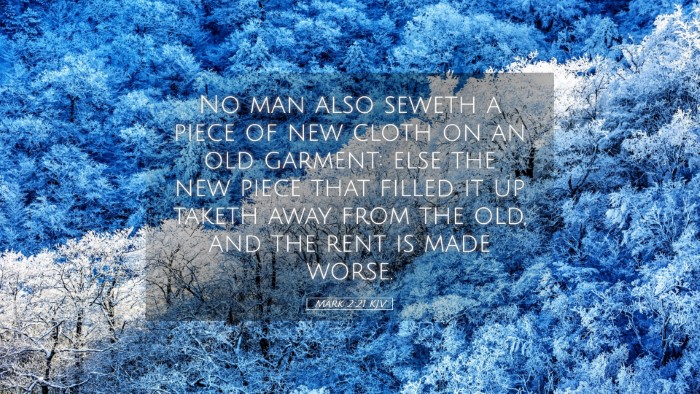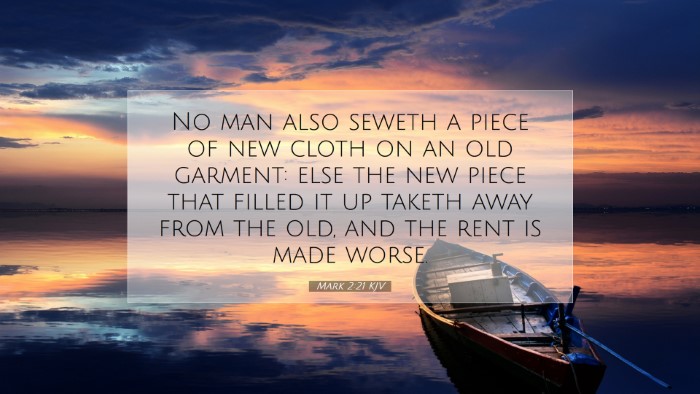Old Testament
Genesis Exodus Leviticus Numbers Deuteronomy Joshua Judges Ruth 1 Samuel 2 Samuel 1 Kings 2 Kings 1 Chronicles 2 Chronicles Ezra Nehemiah Esther Job Psalms Proverbs Ecclesiastes Song of Solomon Isaiah Jeremiah Lamentations Ezekiel Daniel Hosea Joel Amos Obadiah Jonah Micah Nahum Habakkuk Zephaniah Haggai Zechariah MalachiMark 2:21
Mark 2:21 KJV
No man also seweth a piece of new cloth on an old garment: else the new piece that filled it up taketh away from the old, and the rent is made worse.
Mark 2:21 Bible Commentary
Commentary on Mark 2:21
Mark 2:21 (KJV) - "No man also seweth a piece of new cloth on an old garment: else the new piece that filled it up taketh away from the old, and the rent is made worse."
Introduction
This passage serves as an important metaphor reflecting the transformative nature of Jesus' ministry and the implications of the new covenant. It highlights the distinctions between the old practices of Judaism and the new teachings of Christ, which are meant to fulfill and not merely patch up the old order.
Contextual Analysis
Understanding this verse requires us to consider its context. Mark 2 features a series of confrontations between Jesus and the religious leaders regarding His authority and the nature of His ministry. He is seen to challenge the prevailing interpretations of the Law, presenting a radical new way of understanding divine acceptance and righteousness.
Insights from Matthew Henry
According to Matthew Henry, this verse illustrates that the new covenant cannot be combined with the old ways of the law. He emphasizes the incompatibility of Christ's radical teachings with the traditional practices of the Jewish faith. Henry notes, "Christ did not come to patch up the old religion, but to establish a new one." This implies that any attempt to merge the two would result in a failure to grasp the fullness of the Gospel.
Insights from Albert Barnes
Albert Barnes elaborates on the practical implications of this metaphor. He points out that new cloth, when sewn onto old garments, does not only fail to remedy the old but actually exacerbates the situation. He states, "The new, being unshrunk, will pull away from the seams when washed, leading to further damage." This suggests that placing new teachings upon old, worn-out systems of belief not only proves ineffective but also leads to a more significant breach in understanding.
Insights from Adam Clarke
Adam Clarke remarks on the symbolism present in this verse. He suggests that the old garment represents the Jewish law and its various rituals, while the new cloth signifies the fresh, vigorous faith of the Gospel. Clarke asserts, "To attempt the combination is to disregard the nature of the two, resulting in a scenario where both are compromised." His commentary offers a deeper understanding of the consequences of failing to recognize Jesus' new teaching as completely distinct from the old covenant expectations.
Theological Implications
Mark 2:21 is not merely about clothing; it serves as a clarion call to understand the radical change that Christ brings into the world. Theological implications can be observed in several areas:
- Understanding of Salvation: The new covenant emphasizes grace over works, presenting a complete reliance on Christ's sacrifice for redemption.
- Community Dynamics: The early Church had to navigate these changes, where Jewish and Gentile believers had to find unity under the new covenant, challenging existing cultural barriers.
- Personal Faith Journey: Individuals are called to reconsider their foundational beliefs and be open to transformative understanding that may conflict with traditional teachings.
Practical Applications
For pastors, students, and theologians, this verse calls for introspection regarding how we approach faith and practice today. Some practical applications include:
- Evaluate Traditions: Are our current practices in line with the revolutionary spirit of Christ's teachings, or are they merely remnants of a past understanding?
- Spiritual Renewal: Encourage a mindset that is open to the new ways God may be leading His people today, recognizing that change can be uncomfortable but necessary for growth.
- Engaging with Others: Be aware of the transformations in faith discussions and be ready to share the tenets of the Gospel that speak to a world in need of grace and hope.
Conclusion
Mark 2:21 serves as a reminder of the ongoing need to embrace the newness that Christ brings into our lives. It challenges us to shed old mindsets and embrace the fullness of the new life offered through faith in Jesus. The insights of Matthew Henry, Albert Barnes, and Adam Clarke together elucidate the verse’s depth and significance, compelling believers to reflect on their journey of faith within the broader narrative of God’s redemptive plan.


